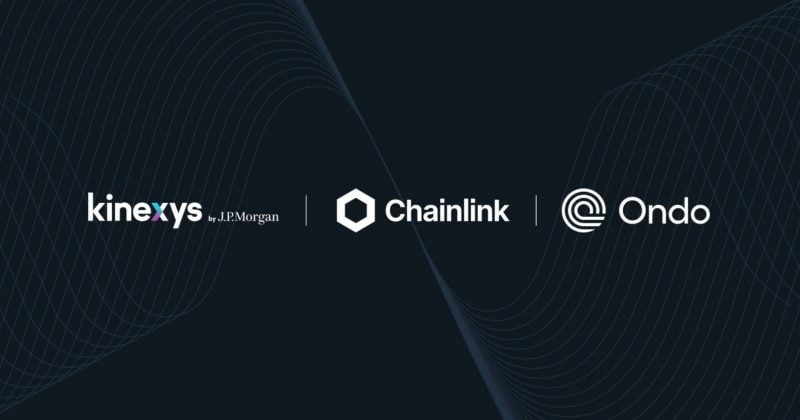JPMorgan completes first public tokenized treasury trade in partnership with Ondo Finance, Chainlink


Key Takeaways
- JPMorgan completed its first public tokenized treasury trade on Ondo blockchain, using Chainlink’s protocol.
- This development marks JPMorgan’s first interaction with a public blockchain, moving away from a private network.
Share this article
JPMorgan Chase has completed its structured transaction on a public blockchain for the first time after years of operating exclusively within private, permissioned networks tailored to institutional clients, according to a Wednesday press release.
The testnet transaction was conducted in partnership with Ondo Finance, a major player in real-world asset (RWA) tokenization, and Chainlink, the leading cross-chain oracle network, using infrastructure provided by both firms and executed through JPMorgan’s blockchain division, Kinexys.
According to the companies, the trade involved the exchange of tokenized short-term US Treasuries issued on Ondo Chain, a newly launched layer 1 blockchain purpose-built for scalable, institutional-grade RWA issuance.
The payment leg of the transaction was processed through Kinexys Digital Payments, JPMorgan’s permissioned blockchain network, with Chainlink’s Cross-Chain Interoperability Protocol (CCIP) and Runtime Environment (CRE) coordinating the cross-chain settlement.
“By securely and thoughtfully connecting our institutional payments solution with both external public and private blockchain infrastructures seamlessly, we can offer our clients and the broader financial ecosystem a wider range of benefits and scalable solutions for settling transactions,” said Nelli Zaltsman, head of platform settlement solutions at Kinexys.
The move represents a key advance as the Delivery versus Payment (DvP) model, which was used to settle the transaction to ensure that the asset and payment are exchanged simultaneously while reducing counterparty risk, is rarely executed successfully across separate blockchain networks.
This DvP transaction was enabled through Chainlink’s cross-chain infrastructure, allowing secure, atomic settlement between JPMorgan’s private network and Ondo’s public blockchain.
The testnet transaction shows that real-world assets can now be issued, traded, and settled on-chain using compliant infrastructure, said Nathan Allman, CEO of Ondo Finance, in a statement.
Chainlink’s co-founder Sergey Nazarov said the move is a “clear sign” that major banks are moving beyond experimenting with public blockchain infrastructure to implementing it.
“Chainlink has been built to enable the secure and reliable execution of institutional-grade transactions just like this, across multiple blockchains and with the compliance required by large institutions like JPMorgan,” Nazarov stated.
“It is becoming increasingly clear to the world’s institutions that they have a large addressable market in the public chain community and that they need a reliable set of technical standards and cross-chain connection capabilities to successfully transact in this new world,” he added.
JPMorgan has been a pioneer among global banks in exploring and implementing tokenization. The bank’s tokenization initiatives have primarily relied on private, permissioned blockchains, especially through its Onyx platform.
It’s the first institutional-grade, production-focused integration of a public ledger using real assets, a decentralized middleware, and a repeatable architecture, although JPMorgan has previously explored blockchain-based interoperability.
Through it, the effort is elevated from experimentation to strategic deployment, potentially creating a template for future public-private financial infrastructure.
Share this article
Recent Posts
Prime Day is Finally Over But These 142 Deals Are Still Available
Prime Day may be over, but not every deal is dead. These hand-picked Prime Day…
Ripple taps BNY to secure RLUSD stablecoin with institutional-grade custody
Key Takeaways Ripple has chosen BNY Mellon as the primary custodian for RLUSD stablecoin reserves.…
Fold CEO Warns Altcoins To Remain Speculative, Says Bitcoin’s Market Dominance ‘Something That Can’t Be Reversed’
The chief executive of Bitcoin (BTC) financial services firm Fold is issuing a warning about…
AI leadership development platform Praxis Labs sells to Torch
Praxis Labs, a learning development platform, announced its acquisition on Thursday for an undisclosed amount…
Bitcoin ETFs Log Another $1 Billion Day as Institutional Momentum Breaks Records
Bitcoin exchange-traded funds (ETFs) posted another billion-dollar inflow on Friday, their second in a row,…
Ethereum Projections: ETH Gains Wall Street Cred as Fidelity Calls It a Store of Value
Ethereum is catching the attention of Wall Street in a serious way. In a recent…